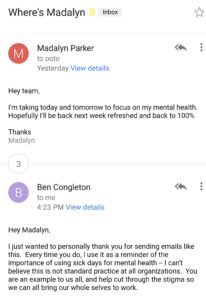5 Ways Managers Can Support Their Team’s Mental Health
Burnout, anxiety and depression are hitting record levels among workers.
According to a 2021 report from Mind Share Partners, 75% of full-time US workers reported experiencing at least one symptom of a mental health condition in the past year – up from 59% in 2019. The pandemic created a confluence of conditions, from social isolation and financial worries to grief from bereavement, that worsened mental health for many, especially women and young people.
This has serious repercussions for workplace productivity, job performance, and employee engagement. Good news is that companies are stepping up. We are seeing increased investment into mental health benefits and support systems, such as EAPs and flexible work schedules, designed to improve employee mental well-being.
Nonetheless, one of the most impactful ways to improve employee mental well-being still lies in the actions of the managers and leaders who lead their team members day in and day out.
What can managers do to positively grow the mental well-being of their team members?
Here are five ways managers can Support employee mental health.
1. Normalize Conversations Around Mental Health At Work
When you’re not feeling physically well, perhaps you have a cold or recently broke your leg, the expected thing to do is to call in sick and take time off to get better. Would you do the same if you’re not feeling mentally well?
Unfortunately, most would say “no”. Society has attached a negative stigma to mental health and conditioned us to think of it as less deserving of care than physical health.
So how can we overcome this stigma in the workplace? Let’s start by normalizing conversations about the importance of mental health within your team. Take this exchange between Madalyn Parker and the CEO of the company she works at.

Subsequently, Madalyn talked about why it was important to openly discuss the reason for taking two days off.
Madalyn added, “I’m specific to be an example so my team knows that they can feel comfortable taking sick leave for mental health, even if they don’t say it.”
As a manager, talking openly about your own vulnerabilities and treating your team member’s mental health concerns with empathy is a key step towards improving your team’s mental health.
2. Keep A Culture Of Connection With Regular Check-Ins
Mental health struggles may not always be obvious to the eye of the beholder. Finding opportunities to check-in regularly on the mental well-being of your team members helps to proactively identify issues.
One way to do this is to dedicate five minutes in your regular one-on-ones sessions to discussing and understanding factors impacting your team member’s mental well-being.
- Mood swings
- Withdrawal from social interactions with other employees
- Decrease in productivity or quality of work
- Increased absenteeism and/or tardiness
- Changes in eating/drinking habits
Since mental health is a sensitive topic that not everyone is comfortable to talk openly about, it is also important to provide a safe space for share their concerns. Anonymous pulse checks can provide a safe channel for employees to share their concerns. Are stress levels in your team chronically high? Do people feel like mental health is a priority in the company? As a manager, you can use these insights to adapt how you support the mental well-being of your team.
3. Instill Growth Mindsets To Improve Mental Resilience
Do you believe that intelligence and talents are qualities you can learn? Or is it something you either have or don’t have? Turns out, this difference in mindset (growth vs. fixed mindset) significantly impacts your mental health. That’s because it fundamentally challenges how you approach difficulties, obstacles and challenges you encounter.
Studies show that just a single lesson in growth mindset improves an individual’s ability to cope with stress, and reduces symptoms of depression and anxiety.
4. Create Opportunities For Meaningful Social Connections
Humans are social beings. We are biologically hardwired with the desire to stay connected with fellow human beings. When that connection is cut off, social isolation and loneliness is the outcome and this leads to a host of physical and mental health issues.
“In one study, they found that being socially isolated reduces our lifespan in a way that compares to smoking 15 cigarettes a day.” – Harvard Health Publishing
As a manager, it is imperative to create opportunities (remote or in-person) to foster meaningful social connections between team members. Psychologist and corporate strategist Melanie Katzman talks about “creating shared rituals” to break down barriers and build team connections in a simple and sustainable manner. Some examples include:
- Sending a gratitude note to a colleague at the end of every way
- Recognizing team accomplishments at the end of every week
- One-on-one coffee breaks with a different colleague every week
5. Be A Mental Fitness Role Model For Your Team
Training a mentally fit and resilient team starts with you. If you do not put your mental well-being first, don’t expect your team members to make it their priority.
That means paying attention to and taking time off to refresh your mind. Neuroscientists are uncovering effective ways for you to train your mental strength. This can be as simple as taking a deep (diaphragmatic) breath in the face of stress, whether that is a big presentation or a traffic jam, or introducing walking meetings to boost your endorphins.
Learn more about how to build your brain fitness program with this Harvard Health Letter on “A workout for your brain”.
Key Learnings
- Managers are in a unique position to significantly impact their team members’ mental health. So if you’re managing a team, pay attention.
- Five things you can do today to improve mental well-being in your team:
- Normalize conversations around mental health at work.
- Keep a culture of connection with regular check-ins.
- Instill a growth mindset in your team to improve mental resilience.
- Create opportunities for meaningful social connections.
- Be a mental fitness role model.
Jane Chung is the CEO of Perked! (www.perked.co) where they make it easy to continuously listen to your employees’ feedback and ideas and gain data-driven insights to build an agile, adaptable, and resilient organization. She is one part entrepreneur, two parts adventurer, and three parts cookie monster.
For the latest HR and business articles, check out our main page.
Reader Feedback
We want to hear from you!
Do you have a story idea you’d like to see covered by PeopleTalk?
Or maybe you’ve got a question we could ask our members in our People & Perspectives section?
Or maybe you just want to tell us how much you liked the article.
The door is always open.









